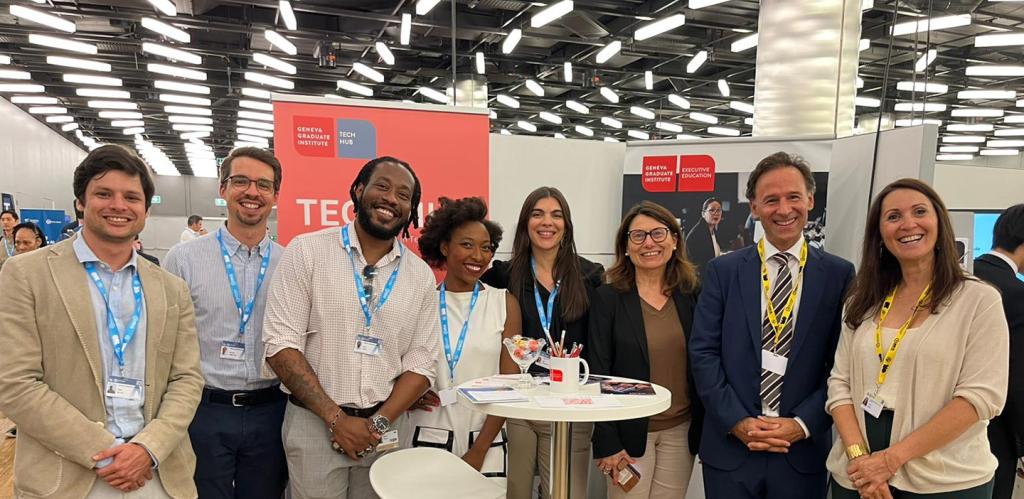"AI is not neutral – its code is political"
At the "AI Skills Coalition Partners Lunch" on 9 July, Marie-Laure Salles, Director of the Geneva Graduate Institute, addressed international stakeholders on the importance of critical awareness and human-centred digital transformation. "The future is in our hands," she said. "It is up to us to make deliberate, thoughtful choices." Echoing this message, Jérôme Duberry, Managing Director of the Tech Hub and Co-Director of Executive Education, emphasised AI's social and political dimensions. "AI is not neutral, its design is political, and its code carries societal, environmental, and ethical consequences," he stated. "We must ensure that technological development is grounded in democratic values, human rights, and planetary boundaries."
This call for inclusive and responsible AI was echoed in Duberry's engagements throughout the Summit, notably during a high-level working lunch on 9 July hosted by H.E. Ambassador Christophe Payot, Permanent Representative of Belgium, in the presence of H.E. Vanessa Matz, Belgian Minister for Public Action and Modernisation.
The lunch gathered diplomats, UN leaders, and thought leaders, including H.E. Amandeep Gill (UN Under-Secretary-General for Emerging Technologies), H.E. Henri Monceau (OIF), and Mahamane Cissé-Gouro (OHCHR), to explore the societal implications of AI, with a strong focus on human rights, democracy, and gender equality.
Key outcomes from the discussion included:
- A call for globally coordinated AI governance rooted in human rights and inclusive participation.
- The need to preserve linguistic and cultural diversity in AI development, notably through the engagement of the Francophonie.
- The importance of enhancing AI literacy and digital inclusion, especially for women and marginalised groups.
- Recognition that public services must remain accessible offline to avoid reinforcing inequalities.
- A discussion on the evolving relationship between public institutions and private tech providers, with the Belgian digital identity solution itsme presented as a successful example of transparent, citizen-trusted innovation.
From High-Level Dialogue to Real-World Innovation: Open Source AI in Action
The Institute's contribution to the Summit extended beyond policy dialogue. On 10 July, Jérôme Duberry moderated a high-level workshop titled "Open Source (Generative) AI for Public Services Innovation," which explored how open technologies can power trustworthy, auditable, and inclusive AI. Organised by Dr David Manset, Senior Project Coordinator of the EC-funded OSEE project (Open Source Ecosystem Enablement for Public Services Innovation) at ITU, the workshop convened developers, policymakers, and international experts to showcase concrete applications of AI for digital public services — connecting the governance principles discussed at the diplomatic level with real-world tools for implementation.
Three major milestones stood out:
- The preview announcement of the IEEE–ITU GenAI for Good Challenge, a global initiative to co-create public service–oriented AI assistants in collaboration with UN agencies and local partners.
- A live demonstration of GenieAI, an open-source generative AI framework for building SDG-aligned digital public services.
- The showcase of Kenya's AI-powered public chatbot, co-developed with GIZ and the global community, as a working example of sovereign, citizen-centric innovation supported by open source and multilateral cooperation.
Looking Ahead
As AI technologies evolve, the Geneva Graduate Institute remains committed to advancing equitable and sustainable digital futures. By integrating academic expertise with multistakeholder dialogue, the Institute continues to bridge the technical, political, and ethical dimensions of AI governance. Building on its active role at the AI for Good Global Summit 2025, the Institute will deepen partnerships with international actors to ensure AI serves the public good and respects fundamental rights worldwide.


